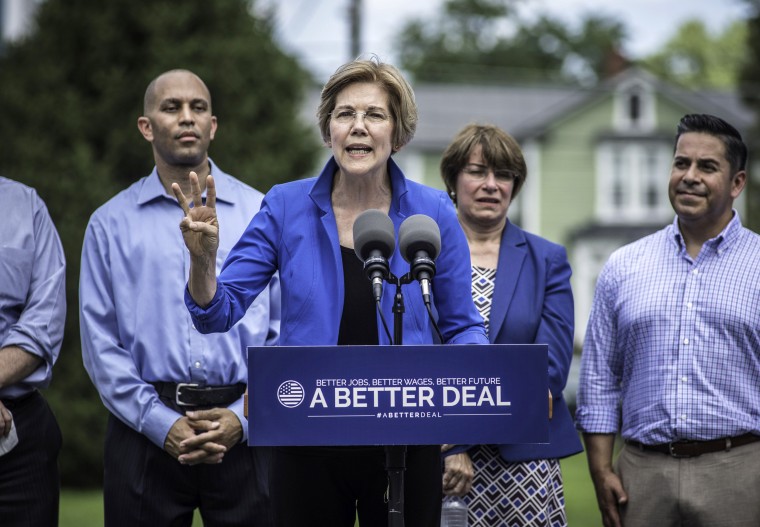WASHINGTON — Not long ago, Democratic presidential hopefuls shied away from talking about gun control — or at least made sure to pepper their rhetoric with nods to the Second Amendment.
Not anymore.
In the wake of Sunday night's shooting massacre in Las Vegas, which left at least 58 people dead and more than 500 people injured, several of the leading potential Democratic 2020 presidential candidates were quick to blame mass killings on guns — even though it's an issue that has burned their party politically in the recent past.
"We cannot simply throw up our hands or continue to justify the presence of weapons of war whose primary purpose is to kill the largest number of human beings in the shortest amount of time possible," freshman Sen. Kamala Harris, D-Calif., said in a statement.
Sen. Elizabeth Warren, D-Mass., who has urged fellow Democrats to advocate for gun control, tweeted that it's time for a national conversation about guns.
And Vermont Sen. Bernie Sanders, who was hammered for sometimes voting with the gun lobby by Hillary Clinton in the 2016 Democratic presidential primary, said Americans should do "everything we can" to stop gun violence.
They all sound far less measured than Barack Obama did when he first ran for the Democratic presidential nomination in 2008. "We can have reasonable, thoughtful gun control measure[s] that I think respect the Second Amendment and people’s traditions," Obama said in February 2008.
Jaime Harrison, former chairman of the Democratic Party in South Carolina, said his party's hopefuls are demonstrating leadership on a tough issue without regard to electoral risks.
"Is winning elections that important that you're willing to risk countless lives — even the lives of kids? I don't think so," he said.
But Democrats also appear to have concluded that they have little to gain in the political or policy realms from trying to strike a balance on guns, as a cautious Obama did the first time he ran for the White House.
Neither the shootings of members of Congress — then-Rep. Gabby Giffords, D-Ariz., and Rep. Steve Scalise, R-La., in separate incidents— nor a rampage against elementary school children in Newtown, Connecticut, prompted Congress to pass new firearms restrictions. Congress is "too weak and too cowardly" to challenge gun-rights groups, said Sen. Kirsten Gillibrand, D-N.Y., a potential presidential candidate who supported some gun rights as a member of the House.
In the electoral arena, candidate Donald Trump accused Clinton during the campaign last year of wanting to "take your guns away" and "abolish the Second Amendment" — pumping up the Republican base — even as she argued that she wanted to do neither.
But just as they have little reason to expect that a nuanced approach will win over gun-rights advocates, Democratic candidates know that they can curry favor with their own primary electorate by aggressively supporting gun control.
With the promise of a crowded primary in 2020, it follows that Democratic hopefuls would be certain not to find themselves cross-wise with the base on such a potent issue. A similar dynamic is playing out in the health care realm for Democrats with supporting Sanders' single-payer plan becoming something of a litmus test for 2020 hopefuls.
"The conversation has changed based on both events and the political environment," said Ben LaBolt, a Democratic strategist and former Obama spokesman. "Politically, the party split has calcified, true independents in the center have shrunk, and therefore there's less focus on appearing to balance both sides as there is demand from the base to take a stand on a critical issue."
Chris Kofinis, who advised John Edwards' 2008 presidential campaign, said gun control is not yet a litmus-test issue for Democrats but that it's becoming one. The danger for his party's candidates, he said, is that to take the White House they have to win Republican-leaning states where gun-owners' rights are popular. That, he said, may require politicians to lead voters rather than following them.
While Democrats like to point to overwhelming public approval of certain specific gun-control measures, an NBC/Wall Street Journal "social trends" poll showed that 50 percent of Americans are concerned that government will do too much to curb gun rights while 45 percent fear that government will do too little to regulate access to firearms.
"The politics become clearer in the primary, but more muddy in the general election," Kofinis said. "That's the brutal political reality."

